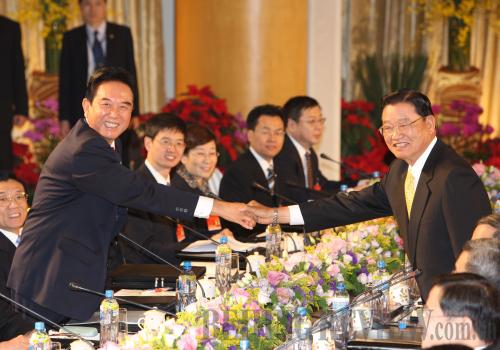|
 |
|
HISTORIC HANDSHAKE: Chen Yunlin (left), President of Chinese mainland's Association for Relations Across the Taiwan Straits and Chiang Pin-kung (right), Chairman of Taiwan's Straits Exchange Foundation, shake hands before beginning talks in Taichung, Taiwan on December 22 (YUAN MAN) |
Groundbreaking Talks
Chinese mainland and Taiwanese negotiators agreed to cooperate on agricultural quarantine issues and cross-Straits employment of fishermen, as well as to deal with different product quality standards.
Three agreements were reached at the talks between the mainland's Association for Relations Across the Taiwan Straits (ARATS) and Taiwan's Straits Exchange Foundation (SEF). The ARATS and SEF talks began on December 22. It was the fourth round of negotiations since the two sides resumed talks in June 2008 after a 10-year suspension.
Experts from both sides hailed the latest agreements as a move forward in clearing obstacles and facilitating cross-Straits economic and trade partnership.
Local Representation
A draft amendment on China's electoral law that guarantees the number of local deputies representing farmers, workers and intellectuals was reviewed on December 22 by a bimonthly session of China's top legislature.
The amendment requires that "both rural and urban areas adopt the same ratio of deputies to the represented population in elections of People's Congress deputies."
As the law now stands, one National People's Congress (NPC) deputy represents each 960,000 rural residents or each 240,000 urban residents. Residents do not directly vote for NPC deputies, which are selected by local People's Congresses.
Critics say this could mean that farmers only enjoy a quarter of the suffrage of their urban counterparts. The draft amendment will be deliberated at the NPC's annual session next year.
Job Opportunities
China generated 10.13 million new jobs in urban areas from January to the end of November after the government stepped up efforts to ensure adequate employment, said Yin Weimin, Minister of Human Resources and Social Security, on December 18.
The urban jobless rate will likely reach 4.3 percent by the end of the year and the total number of employed will surpass 11 million.
To help more than 7 million college graduates land jobs, China has unveiled a slew of measures including giving financial support to business startups and encouraging enterprises to provide internships for graduates.
Nearly 152 million migrant workers found new jobs outside of their hometowns in the first three quarters, a rise of 11.57 million from the same period a year ago.
Water Prices Rise
Beijing raised water prices by 8 percent starting on December 22 to encourage conservation in the Chinese capital. Authorities hiked the price of water for residential use by 0.3 yuan ($0.04) to 4 yuan ($0.59) per cubic meter, the municipal development and reform commission said.
The price rise came days after 22 out of 25 representatives at a public hearing voted for an increase of 0.9 yuan ($0.13), or 24.3 percent, in three years.
Several other Chinese cities are also planning to raise water prices.
Migrant Children's Fund
China's Ministry of Finance announced on December 21 that it has allocated 2 billion yuan ($294 million) for urban schools that admit the children of migrant farmer workers.
The move is intended to provide better education for these children, the ministry said.
The ministry urged local authorities to focus on urban schools that admit migrant children and have inadequate facilities when arranging funds.
A large number of rural migrants have flocked to cities, bringing about 20 million children with them, according to the Children's Foundation of China. | 